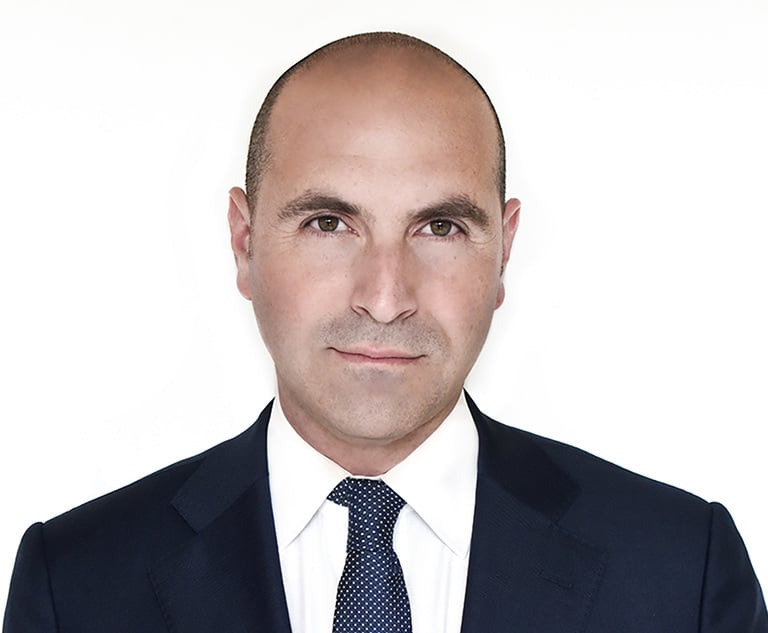Florida Judge Should Have Recused Himself When Litigant Hired His Fiance's Firm, Federal Judge Rules
U.S. District Judge Cecilia Altonaga could envision the newspaper headlines. "The public could reasonably question a headline (accurately) reading, 'Judge finds in favor of trustee after trustee's counsel hires the judge's fiance and member of his household,'" she wrote.
August 14, 2019 at 02:34 PM
6 minute read
 U.S. Bankruptcy Court Judge John K. Olson of Fort Lauderdale. Photo: Jill Kahn/ALM.
U.S. Bankruptcy Court Judge John K. Olson of Fort Lauderdale. Photo: Jill Kahn/ALM.
U.S. District Judge Cecilia M. Altonaga in the Southern District of Florida threw out three rulings in a long-running case over claims that U.S. Bankruptcy Judge John Olson should have recused himself because his then-fiance accepted a job with the firm representing one of the parties.
Defendants in a 2008 adversary proceeding brought by trustee Soneet R. Kapila claimed Olson was not a neutral figure because the trustee had hired the firm that employed his then-fiance. They filed a motion to vacate three of Olson’s rulings against them, claiming the judge’s spouse George Steve Fender, a Miami bankruptcy and commercial litigator, had joined Ruden, McClosky, Smith Schuster & Russell’s bankruptcy practice group during litigation. The couple would later wed in 2010.
Even though Fender wasn’t involved in the case, Altonaga agreed with defendants. She found that having the judge’s spouse working for the plaintiff’s firm could raise the specter of impropriety and be enough to damage public confidence in the judiciary.
In fact, Altonaga could already envision the news headlines.
“The public could reasonably question a headline (accurately) reading, ‘Judge finds in favor of trustee after trustee’s counsel hires the judge’s fiance and member of his household,’” she wrote.
Rules of judicial conduct prevent Olson from commenting on pending litigation.
But the bankruptcy judge initially refused to step down, finding that recusal wasn’t necessary because his fiance was a salaried employee, not an equity partner who might personally benefit financially from the litigation.
“He is not directly involved in these proceedings, and case-law is clear that this is too tenuous a relationship to require a recusal,” Olson wrote.
Altonaga saw things differently.
“A judge, via his fiance’s prospective (and ultimately realized) financial relationship with a firm representing one of the parties in a case cannot be surprised that the other party, or an objective observer, would question his impartiality,” the ruling said.
Aside from overseeing their individual cases, federal judges also have an obligation to avoid even the appearance of impropriety under 28 U.S. Code section 455(a).
“If anything, this order will encourage judges to be vigilant in screening future cases for conflicts of interest and giving fair consideration to requests for recusal when attorney-members of their household are seeking, and obtain, employment with counsel for one of the parties in a pending suit,” Altonaga wrote.
Though there’s no automatic need for recusal if a judge’s relative works for a certain firm, Altonaga found this case stood out because Fender was offered “a thing of value” while the case was pending.
Fender has since left the firm to start his own practice in Fort Lauderdale. He did not respond to a request for comment.
Read the ruling:
What happened?
The issue sprang from a business dissolution.
When Pennsylvania-based Trafford Distributing Center Inc. became insolvent in 2008, its sole shareholder Barbara Wortley filed for Chapter 7 bankruptcy protection. Numerous claims sprouted from that bankruptcy, including this one, accusing Liberty Properties LLC, Liberty Associates LC and Advanced Vehicle Systems LLC of fraudulent transfers and seeking to recover property.
The defendants were late disclosing an expert witness and related reports, which the plaintiff argued harmed its client in the run-up to trial, according to the order. The defense claimed the tardiness was justifiable and harmless, but Olson disagreed and declined to consider the late filings. After a January 2010 bench trial, Olson sided with the trustee, awarding a total of almost $300,000 in damages against Liberty Properties, Liberty Associates and Advanced Vehicle Systems.
Related: Nuanced Appellate Decision in Case Claiming Bankruptcy Judge Conflict
Robert Sweetapple represented all defendants in the bankruptcy case and argued the motion to recuse after discovering the fiance link. Sweetapple claims he decided to investigate after getting an ”uncomfortable feeling” about Olson before the judge entered a $2.3 million judgment against Wortley—another defendant in the same bench trial.
“I think the headline that Judge Altonaga crafted makes it clear that this should have never occurred,” Sweetapple said. “I’ve been practicing 39 years and I’m happy to say that I’ve never seen anything remotely approaching this happen before.”
Appeals against the Wortley judgment and another ruling are pending before Judges Federico A. Moreno and Ursula Ungaro.
Attorneys Michael Bakst, Morris Miller, Marla Neufeld, Paul Avron, Heather Ries and Rilyn Anne Carnahan represented the trustee. They did not respond to a request for comment by deadline.
Altonaga acknowledged that during a status conference, Moreno, one of the judges adjudicating the Wortley case, had expressed concern about Olson’s reluctance to recuse himself.
According to Altonaga’s court order, Olson recused himself when presented with a transcript from that conference. A second bankruptcy judge, Raymond B. Ray, recused himself, then Judge A. Jay Cristol denied the defense’s motion to vacate Olson’s rulings.
But Altonaga found neither of those judges had properly addressed Olson’s relationship with Fender, even though the defendants’ argument was “well taken for several reasons.”
Altonaga leaned on other court rulings acknowledging a basis for recusal over connections between a judge and one of the parties. She cited the Eleventh Circuit, which found a federal judge should have recused himself when his law clerk was the son of a partner at the defendant’s firm. The Seventh Circuit also held that recusal was required when a trial judge unintentionally contacted the firms representing both parties in a case before him about prospective employment.
Other judges have stepped down because of family connections. In July, for instance, U.S. District Chief Judge Mark E. Walker in the Northern District of Florida recused himself from a case because one of the defense attorneys worked at Holland & Knight, where Walker’s wife, Karen D. Walker, is executive partner in the Tallahassee office.
Read more:
Did a Federal Judge Have to Drop a Case Because His Wife Works for Defense Firm Holland & Knight?
Does a prosecutor need to reveal his wife works at a firm involved in a trial?
This content has been archived. It is available through our partners, LexisNexis® and Bloomberg Law.
To view this content, please continue to their sites.
Not a Lexis Subscriber?
Subscribe Now
Not a Bloomberg Law Subscriber?
Subscribe Now
NOT FOR REPRINT
© 2025 ALM Global, LLC, All Rights Reserved. Request academic re-use from www.copyright.com. All other uses, submit a request to [email protected]. For more information visit Asset & Logo Licensing.
You Might Like
View All
Financially Grounded: South Florida-Based Silver Airways Files for Bankruptcy


US Judge Throws Out Sale of Infowars to The Onion. But That's Not the End of the Road for Sandy Hook Families
4 minute read
Growing Referral Network, Alternative Fees Have This Ex-Big Law’s Atty’s Bankruptcy Practice Soaring
5 minute readTrending Stories
Who Got The Work
J. Brugh Lower of Gibbons has entered an appearance for industrial equipment supplier Devco Corporation in a pending trademark infringement lawsuit. The suit, accusing the defendant of selling knock-off Graco products, was filed Dec. 18 in New Jersey District Court by Rivkin Radler on behalf of Graco Inc. and Graco Minnesota. The case, assigned to U.S. District Judge Zahid N. Quraishi, is 3:24-cv-11294, Graco Inc. et al v. Devco Corporation.
Who Got The Work
Rebecca Maller-Stein and Kent A. Yalowitz of Arnold & Porter Kaye Scholer have entered their appearances for Hanaco Venture Capital and its executives, Lior Prosor and David Frankel, in a pending securities lawsuit. The action, filed on Dec. 24 in New York Southern District Court by Zell, Aron & Co. on behalf of Goldeneye Advisors, accuses the defendants of negligently and fraudulently managing the plaintiff's $1 million investment. The case, assigned to U.S. District Judge Vernon S. Broderick, is 1:24-cv-09918, Goldeneye Advisors, LLC v. Hanaco Venture Capital, Ltd. et al.
Who Got The Work
Attorneys from A&O Shearman has stepped in as defense counsel for Toronto-Dominion Bank and other defendants in a pending securities class action. The suit, filed Dec. 11 in New York Southern District Court by Bleichmar Fonti & Auld, accuses the defendants of concealing the bank's 'pervasive' deficiencies in regards to its compliance with the Bank Secrecy Act and the quality of its anti-money laundering controls. The case, assigned to U.S. District Judge Arun Subramanian, is 1:24-cv-09445, Gonzalez v. The Toronto-Dominion Bank et al.
Who Got The Work
Crown Castle International, a Pennsylvania company providing shared communications infrastructure, has turned to Luke D. Wolf of Gordon Rees Scully Mansukhani to fend off a pending breach-of-contract lawsuit. The court action, filed Nov. 25 in Michigan Eastern District Court by Hooper Hathaway PC on behalf of The Town Residences LLC, accuses Crown Castle of failing to transfer approximately $30,000 in utility payments from T-Mobile in breach of a roof-top lease and assignment agreement. The case, assigned to U.S. District Judge Susan K. Declercq, is 2:24-cv-13131, The Town Residences LLC v. T-Mobile US, Inc. et al.
Who Got The Work
Wilfred P. Coronato and Daniel M. Schwartz of McCarter & English have stepped in as defense counsel to Electrolux Home Products Inc. in a pending product liability lawsuit. The court action, filed Nov. 26 in New York Eastern District Court by Poulos Lopiccolo PC and Nagel Rice LLP on behalf of David Stern, alleges that the defendant's refrigerators’ drawers and shelving repeatedly break and fall apart within months after purchase. The case, assigned to U.S. District Judge Joan M. Azrack, is 2:24-cv-08204, Stern v. Electrolux Home Products, Inc.
Featured Firms
Law Offices of Gary Martin Hays & Associates, P.C.
(470) 294-1674
Law Offices of Mark E. Salomone
(857) 444-6468
Smith & Hassler
(713) 739-1250






